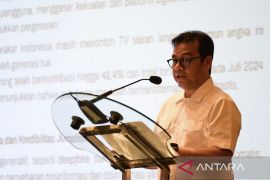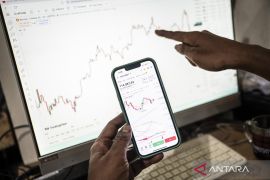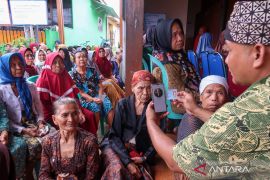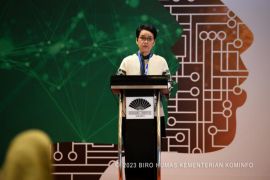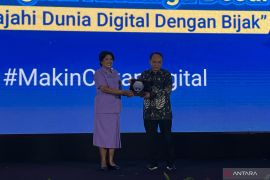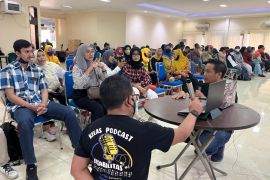Adult literacy programs do not get much attention. In fact, people who do not have basic literacy skills have been the most impacted during the COVID-19 pandemicJakarta (ANTARA) - The COVID-19 pandemic has forced everyone to get to know and become conversant with digital technology. Nearly all the activities that were earlier done face-to-face or manually, such as meeting people and making cash transactions, are now being performed virtually.
The use of technology has grown consistently during the pandemic, given the need for everyone to maintain physical distance and communicate virtually. Digital technology is currently being used for smaller tasks, such as shopping and online payments, as well as for more advanced ones.
Data from Katadata's 2020 research has shown that online shopping increased by 73 percent, while online payments climbed 65 percent in 2020. A similar trend was seen in the use of online health consultation applications, which rose 600-percent during the pandemic.
Despite the increased adoption of technology, many people are still facing difficulties due to a lack of digital skills whether in using devices or accessing the Internet. This has become a whole new problem.
According to President Joko Widodo, the COVID-19 pandemic must serve as a momentum for digital transformation in Indonesia as it has changed normal lifestyles and brought a new kind of order. "The pandemic has compelled the use of digital technology for all things in life, such as studying, working, and consumption pattern of the people," he remarked.
Related news: Cybersecurity literacy increasingly critical to support successful digital transformation: Huawei TechDay 2021
He meant that digital transformation should not be avoided, and instead be embraced and utilized by everyone so that they can gain digital skills, no matter how small.
According to the 2020 IMD World Digital Competition survey, Indonesia currently ranks the lowest in the world when it comes to the two most important things in a digital economy: knowledge and expertise in using technology.
The COVID-19 pandemic has also brought good lessons. The seeping of technology into every aspect of life has had a tremendous impact on the learning and absorption of digital technology.
During an international discussion, secretary general of the Communication and Information Technology Ministry, Mira Tayyiba, said that Indonesia will continue to strive to achieve digital inclusion, wherein all people from different social backgrounds, ages, and income levels will have the same opportunity to participate fully as members of society through digitalization.
The changes triggered by the COVID-19 pandemic in relation to the use of technology have been quick, with students, teachers, and education staff to ordinary people who knew nothing about technology adapting to it in a short time, she noted.
Indonesia is believed to have a strong digital foundation because its population is dominated by young or technologically savvy millennials, she said. With the pandemic spreading everywhere, the number of Internet users is increasing continuously, she added.
Internet users in Indonesia in early 2021 reached 202.6 million, as per official data. This reflected an increase of 15.5 percent or 27 million compared to January 2020. The total population of Indonesia is currently estimated at 274.9 million. This means that Internet penetration in Indonesia in early 2021 will reach 73.7 percent, Tayyiba said.
Related news: Kominfo encourages collaboration to drive digital literacy
Basic Literacy
During the commemoration of International Literacy Day (HAI) 2020, director of the UNESCO Regional Science Bureau for Asia and the Pacific, Shahbaz Khan, had said that the government had formulated many distance learning policies during the pandemic that relied on the use of the Internet, particularly for students learning from home.
The government has launched several learning platforms in collaboration with distance learning providers that can be accessed free of charge by teachers and students via television, the Internet, and other mediums, he noted.
Even though online learning is not as smooth and easy compared to face-to-face learning, at least teachers and students are not left behind, he noted. However, the pandemic has, in fact, created a gap because when the school age group gets access to online learning, adults with minimal literacy skills are automatically marginalized or left out, he said.
"Adult literacy programs do not get much attention. In fact, people who do not have basic literacy skills have been the most impacted during the COVID-19 pandemic. They not only lost their livelihoods, but also their basic understanding due to crisis conditions and life during the COVID-19 pandemic," Khan elaborated.
Related news: Digital literacy drives productivity in digital economy: Ministry
Therefore, he urged all parties to pay close attention to people who lack or do not have basic literacy skills. This is because there is a huge gap that was felt by people who do not have these skills long before the pandemic hit, he said.
The government has stipulated six basic literacy skills: reading and writing, numeracy, scientific literacy, digital literacy, financial literacy as well as cultural and civic literacy, Khan said. The digital literacy movement is necessary for everyone, given the rapid development of information and communication technology in the midst of the COVID-19 pandemic, he added.
According to the UNESCO, Indonesia is one of the countries that has paid attention to the development of literacy. However, on a global level, there are still big challenges to the achievement of global literacy because there are still 773 million adolescents and adults who do not have basic literacy skills, it said.
Related news: Digital literacy essential for digital transformation: Ministry
Digital Adaptation
Adapting to digitalization is important so that economic activities are not hindered during the COVID-19 pandemic, which is projected to continue for some time to come.
As activities cannot return to normal as before, everyone has been forced to change habits. Many people think that the pandemic has brought wisdom in the form of self-renewal and self-improvement. However, one thing is for sure: it has forced individuals within a family unit to move closer to the world of technology, whether through television, smartphones, tablets, laptops, or even Internet-based household electronic equipment.
Moreover, the condition of people in the cities before and after the pandemic has been tied to the Internet network, and the pandemic conditions have actually honed their technological abilities. The pandemic has made several generations more technology-savvy, namely Generation Y or Millennials (1981-1994), Generation Z (1995-2010), and Generation Alpha (born after 2010).
Fathers, mothers, even grandparents, who were initially technologically inept, have slowly begun to understand technology, and even become technologically proficient. People can be technologically adept if they are supported by family members who fall the Generation Y, Generation Z, and Generation Alpha categories, head of applications for Oracle Indonesia, Iman Muhammad, has said.
Related news: Ministries seek to boost digital literacy among madrasa students
Baby Boomers, Generation X, and Generation Y, who or commonly known as millennials, are a generational group based on age, he said. However, the pandemic situation has allowed the birth of a new generation, which is a combination of these various generations, he remarked.
A generation that has been born because people have been forced to use Internet-based technology devices to support daily activities, be it surfing on social media, studying, working, registering online, banking transactions, ordering goods, or buying food, he said. The pandemic situation has pushed many people to conduct their activities and work using digital technology, he added.
The main point in dealing with the pandemic situation is mastering technology, which will then give birth to several innovative solutions, new business actors, and bring up various activities to the online sphere, he said.
Indonesia currently has an established digital foundation. The fact that the country has a dominant population of young people or millennials has offered a very strong opportunity for digitalization.
Related news: President highlights Indonesia's energy, climate commitments at MEF
Related news: Papua PON - Indri Sukmaningsih fighting for gold despite age
Translator: Zita Meirina, Mecca Yumna
Editor: Fardah Assegaf
Copyright © ANTARA 2021



